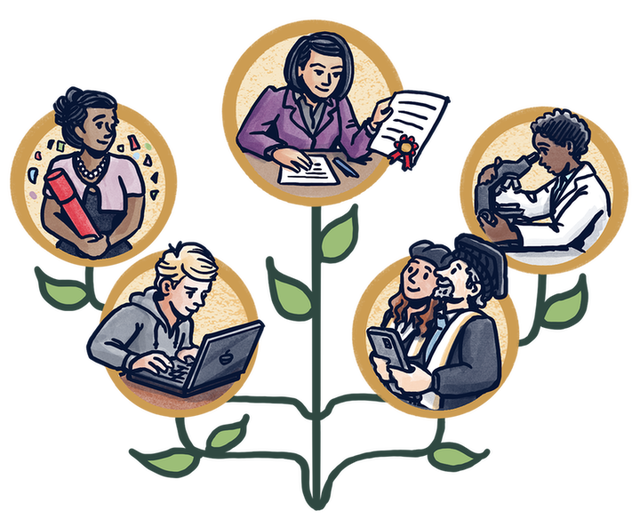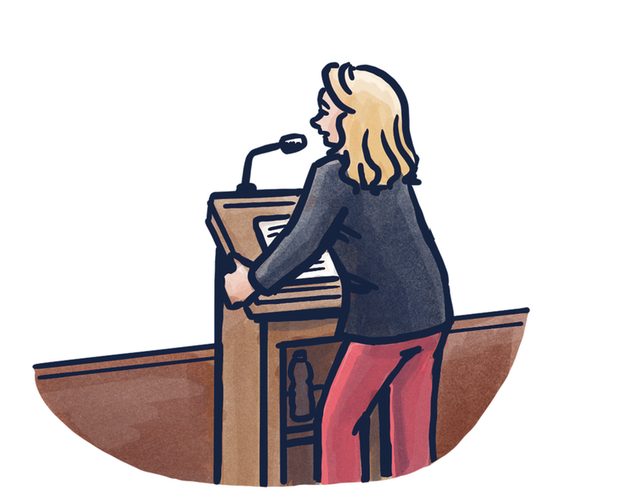3
What’s in a name?
Degrees and teaching at Dutch universities
3.1
Higher professional and academic education
Higher education in the Netherlands follows two tracks. There is academic education (wetenschappelijk onderwijs, wo) and higher professional education (hoger beroepsonderwijs, hbo).
In the higher professional education sector, schools or colleges of higher vocational or professional training (hogescholen, comparable to colleges and polytechnics in other countries) award BAs and MAs. Since 2011, they have been allowed to call themselves ‘University of Applied Sciences’ in English. There are some forty accredited and government-subsidised Universities of Applied Sciences in the Netherlands, including art and design schools, conservatories, the national police academy, and a number of schools offering a variety of study programmes.
For admission to a University of Applied Sciences, students need a secondary vocational (middelbare beroepsonderwijs, mbo) or senior general secondary (hoger algemeen voortgezet onderwijs, havo) qualification. In contrast, the requirements for admission to academic education at one of the research universities is a pre-university (voorbereidend wetenschappelijk onderwijs, vwo) qualification or, alternatively one year of preparatory study (the hbo propedeuse) at a University of Applied Sciences, although this does not apply to all degree programmes.
3.2
Degree programmes
The Netherlands was quick to implement the 1999 Bologna Treaty, introducing the European Credit Transfer and Accumulation System (ECTS) and implementing the BA/BSc degrees (either 3 years [180 credits or ECTS] or 4 years [240 ECTS]) and MA/MSc degrees (typically 1-2 years, sometimes more), in addition to PhD degrees (typically 4 years).
For MAs and MScs, a distinction is made between Academic Masters (typically 1 year [60 ECTS]), which is more vocationally oriented, and Research Masters (typically 2 years [120 ECTS]), which is more research-oriented.
3.3
Accreditation of degree programmes
Degree programmes (opleidingen) must be accredited by the Accreditation Organisation of the Netherlands and Flanders (Nederlands-Vlaamse Accreditatie Organisatie, NVAO). All accredited programmes are registered in the Central Register of Higher Education Programmes (Centraal Register Opleidingen Hoger Onderwijs, CROHO), a unit within the Ministry of Education, Culture and Science (OCW). New degree programmes that want to have their own, new name must apply for a ‘CROHO label’ to be accredited. The procedure is complicated, which is why departments usually decide to use an existing label.
3.4
Grading system
In the Netherlands, a ten point grading system is generally used (usually with one decimal). See a table with grades and their meaning on this webpage of NUFFIC, the Dutch organisation for internationalisation in education. An 8 is considered a high grade. The vast majority of grades lie between 6 and 8, with 6 (or rather, 5.5) being the threshold that allows students to pass an exam or a course. 1-3 are hardly ever awarded, and 9-10 are very rare (<3%). The distinction cum laude can be awarded to excellent bachelor and masters students (around ten percent) upon completion of their degree. Universities may have their own requirements but generally want to see an average grade of 8 or higher in such cases. There is much talk about the propensity of students to ‘scrape by on a six’ (zesjescultuur), instead of working harder in order to earn a higher grade.
PhD degrees have no associated grade, but in very special circumstances (< 5%), a PhD may be awarded the distinction cum laude. The cum laude procedure is complicated, university-specific, and usually involves additional external assessment.
3.5
Teaching language and formats
Though the situation still varies between universities and fields, many undergraduate courses are now taught in English – at least in practice, if not `officially’. This allows international students to participate in such cases, and most standard textbooks are in English anyway. Furthermore, the vast majority of Dutch undergraduates are already comfortable with spoken and written English even at the start of their university studies (though you will find that they still need to sharpen these skills). For masters level courses, the larger fraction of international students makes English a necessity in most cases. Nonetheless, there is still significant debate about the choice between Dutch and English for university-level education in the Netherlands (e.g., see the KNAW-report 'Nederlands en/of Engels').
Teaching formats include lecture courses (hoorcolleges) as well as seminars and tutorials (werkcolleges). Dutch higher education institutions are known for a teaching style that involves a lot of teacher-student interaction and students working together in teams. Therefore, there are also various practical courses (practica) that may involve, e.g., laboratory work and/or small research projects. Academic skills like writing, presenting and computer programming are also taught. In their third year, some students complete a bachelor’s thesis (scriptie), which requires several months of guided research, a written report and presentation. Instructors in higher education tend to be seen as facilitators of knowledge and skill acquisition and as guides on a shared journey of scholarly discovery, rather than simply as conveyors of knowledge.
3.6
Teaching load
The teaching load at Dutch universities can be heavy, as it is in more teaching- intensive higher education institutions in the US, the UK, or Germany. This is especially true for universitair docenten (university lecturers/assistant professors) in the Social Sciences and Humanities, who often spend 70% of their time on teaching and only 30% on research. In some fields, considerable teaching time is spent outside of traditional lecture courses, e.g., via the supervision of practica, second and third year research projects or master’s thesis research. The situation is compounded by long semesters (or trimesters or quarters or `blocks’, depending on the university), which give them a little more than two months of summer break. In Dutch higher education, the academic year begins officially on 1 September and ends on 31 August of the following year, with teaching often continuing into the first weeks of July. For a comparison between duration of the academic year in the Netherlands and abroad and recommendations on making the Dutch academic year smarter, see this report by The Young Academy. Note also that the Dutch are known for their summer holiday routine, which means that most people are away for two or three consecutive weeks in July or August.
Het gebruik van woorden
Uit onderzoek blijkt dat het gebruik van woorden die over het algemeen als vrouwelijk worden beschouwd andere genders vaak niet afschrikken, terwijl woorden die over het algemeen als mannelijk worden beschouwd vrouwen ervan kunnen weerhouden te solliciteren.
Woorden die over het algemeen als vrouwelijk worden beschouwd
Aardig, bedachtzaam/zorgzaam, begripvol, behulpzaam, beleefd, bereidwillig, bescheiden, betrokken, betrouwbaar, flexibel/meegaand, groepsgericht, communicatief, coöperatief, creatief, eerlijk, emotioneel, empathie/empathisch, enthousiast, vrouwelijk, gevoelig, gezellig, aanhankelijk, humaan, onderling afhankelijk, interpersoonlijk, klantvriendelijk, loyaal, medelevend, menselijk, nauwgezet/precies, onderdanig, open, ordelijk, plezierig, sociaal, ondersteuning/ondersteunend, stil/op zichzelf, sympathiek, toegewijd, veelzijdig, verantwoordelijk, verbindend/verbonden, verwantschap, vleiend, dociel, vriendelijk, vrolijk, warm, zachtaardig, voorzichtig
Woorden die over het algemeen als mannelijk worden beschouwd
Actief, agressief, analytisch, assertief, atletisch, autonoom, avontuurlijk, vastbesloten, besluitvaardig, bluffen/opscheppen, chemisch, commercieel, competent, competitief, deskundig, direct, doelgericht, vastberaden, effectief, dominant, energiek, fanatiek, gedreven, gretig/hebzuchtig, overdreven, obstinaat, handig, hiërarchisch, impulsief, individueel, individualistisch, industrieel, ingenieus, innovatief, koppig/star, kracht, kritisch, leider/leiderschap, logisch, mannelijk, mening, moed, moedig, meedogenloos/roekeloos, objectief, zelfstandig, ondernemend, praktijkgericht, principieel, professioneel, resultaatgericht, snel, solide, sterk, stressbestendig, superieur, technisch, leidend, uitdagend, vijandig, volhardend, onafhankelijk, zelfsturend, zelfverzekerd, zelfvoorzienend
Bron: Direction’s research Inclusive Recruitment and Selection (2016), p. 18/19, Vervecken, Verwijvel, Gijbels & Van den Bossche, P. (2015), Pennebaker, Booth & Francis (2007).
Colophon
2022 The Young Academy (De Jonge Akademie)
© Some rights reserved.
Usage and distribution of this work is defined in the Creative Commons License, Attribution 4.0 Netherlands. (CC BY-NC-SA 4.0)
ISBN: 978-90-6984-751-1
The Young Academy
PO Box 19121, NL-1000 GC Amsterdam T+31 (0)20 551 0702
dja@knaw.nl
The Young Academy is an independent part of the Royal Netherlands Academy of Arts and Sciences
Text: Raf de Bont, Tatiana Filatova, Jason Hessels, Nathalie Katsonis, Christian Lange
Illustrations: Rachelle Meyer
Design & realisation: WAT ontwerpers
Platform: H5mag.com
Preferred citation: The Young Academy (2022). A beginner’s guide to Dutch academia, Amsterdam


